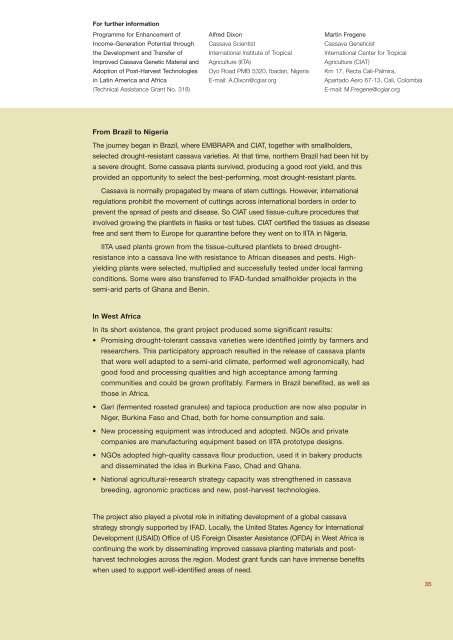Community-based natural resource management - International ...
Community-based natural resource management - International ...
Community-based natural resource management - International ...
Create successful ePaper yourself
Turn your PDF publications into a flip-book with our unique Google optimized e-Paper software.
For further information<br />
Programme for Enhancement of<br />
Income-Generation Potential through<br />
the Development and Transfer of<br />
Improved Cassava Genetic Material and<br />
Adoption of Post-Harvest Technologies<br />
in Latin America and Africa<br />
(Technical Assistance Grant No. 318)<br />
From Brazil to Nigeria<br />
The journey began in Brazil, where EMBRAPA and CIAT, together with smallholders,<br />
selected drought-resistant cassava varieties. At that time, northern Brazil had been hit by<br />
a severe drought. Some cassava plants survived, producing a good root yield, and this<br />
provided an opportunity to select the best-performing, most drought-resistant plants.<br />
Cassava is normally propagated by means of stem cuttings. However, international<br />
regulations prohibit the movement of cuttings across international borders in order to<br />
prevent the spread of pests and disease. So CIAT used tissue-culture procedures that<br />
involved growing the plantlets in flasks or test tubes. CIAT certified the tissues as disease<br />
free and sent them to Europe for quarantine before they went on to IITA in Nigeria.<br />
IITA used plants grown from the tissue-cultured plantlets to breed droughtresistance<br />
into a cassava line with resistance to African diseases and pests. Highyielding<br />
plants were selected, multiplied and successfully tested under local farming<br />
conditions. Some were also transferred to IFAD-funded smallholder projects in the<br />
semi-arid parts of Ghana and Benin.<br />
In West Africa<br />
Alfred Dixon<br />
Cassava Scientist<br />
<strong>International</strong> Institute of Tropical<br />
Agriculture (IITA)<br />
Oyo Road PMB 5320, Ibadan, Nigeria<br />
E-mail: A.Dixon@cgiar.org<br />
Martin Fregene<br />
In its short existence, the grant project produced some significant results:<br />
• Promising drought-tolerant cassava varieties were identified jointly by farmers and<br />
researchers. This participatory approach resulted in the release of cassava plants<br />
that were well adapted to a semi-arid climate, performed well agronomically, had<br />
good food and processing qualities and high acceptance among farming<br />
communities and could be grown profitably. Farmers in Brazil benefited, as well as<br />
those in Africa.<br />
• Gari (fermented roasted granules) and tapioca production are now also popular in<br />
Niger, Burkina Faso and Chad, both for home consumption and sale.<br />
• New processing equipment was introduced and adopted. NGOs and private<br />
companies are manufacturing equipment <strong>based</strong> on IITA prototype designs.<br />
• NGOs adopted high-quality cassava flour production, used it in bakery products<br />
and disseminated the idea in Burkina Faso, Chad and Ghana.<br />
• National agricultural-research strategy capacity was strengthened in cassava<br />
breeding, agronomic practices and new, post-harvest technologies.<br />
The project also played a pivotal role in initiating development of a global cassava<br />
strategy strongly supported by IFAD. Locally, the United States Agency for <strong>International</strong><br />
Development (USAID) Office of US Foreign Disaster Assistance (OFDA) in West Africa is<br />
continuing the work by disseminating improved cassava planting materials and postharvest<br />
technologies across the region. Modest grant funds can have immense benefits<br />
when used to support well-identified areas of need.<br />
Cassava Geneticist<br />
<strong>International</strong> Center for Tropical<br />
Agriculture (CIAT)<br />
Km 17, Recta Cali-Palmira,<br />
Apartado Aero 67-13, Cali, Colombia<br />
E-mail: M.Fregene@cgiar.org<br />
35

















